- Home
- Iain Banks
Stonemouth
Stonemouth Read online
Also by Iain Banks
THE WASP FACTORY
WALKING ON GLASS
THE BRIDGE
ESPEDAIR STREET
CANAL DREAMS
THE CROW ROAD
COMPLICITY
WHIT
A SONG OF STONE
THE BUSINESS
DEAD AIR
THE STEEP APPROACH TO GARBADALE
TRANSITION
Also by Iain M. Banks
CONSIDER PHLEBAS
THE PLAYER OF GAMES
USE OF WEAPONS
THE STATE OF THE ART
AGAINST A DARK BACKGROUND
FEERSUM ENDJINN
EXCESSION
INVERSIONS
LOOK TO WINDWARD
THE ALGEBRAIST
MATTER
SURFACE DETAIL
Copyright
Published by Hachette Digital
ISBN: 9780748116539
All characters and events in this publication, other than those clearly in the public domain, are fictitious and any resemblance to real persons, living or dead, is purely coincidental.
Copyright © 2012 Iain Banks
All rights reserved. No part of this publication may be reproduced, stored in a retrieval system, or transmitted, in any form or by any means, without the prior permission in writing of the publisher.
Hachette Digital
Little, Brown Book Group
100 Victoria Embankment
London, EC4Y 0DY
www.hachette.co.uk
Contents
Also by Iain Banks
Copyright
Dedication
Friday Evening
Chapter 1
Chapter 2
Chapter 3
Chapter 4
Saturday
Chapter 5
Chapter 6
Chapter 7
Chapter 8
Chapter 9
Sunday
Chapter 10
Chapter 11
Chapter 12
Chapter 13
Chapter 14
Monday
Chapter 15
Chapter 16
Chapter 17
Chapter 18
Tuesday Morning
Chapter 19
Author Bio
FOR MY FAMILY
WITH THANKS TO ADÈLE, MIC, RICHARD, VICTORIA,
GARY, URSULA AND LES
FRIDAY EVENING
1
Clarity.
That would have been good.
Instead, a cold, clinging mist. Not even mist; just a chill haze, drifting up the estuary. I’m standing fifty metres above the Firth of Stoun, in the middle of the road bridge, at the summit of the long, shallow trajectory it describes above the waters. Below, wind-stroked lines of breakers track up the firth, ragged creases of thin foam moving east to west under the steady push of the breeze; each wave forming, breaking, widening, then collapsing again before new crests start to rise amongst their pale, streaked remains, the whole doomed army of them vanishing like ghosts into the upriver blur.
Traffic moves on the northbound carriageway behind me; cars tearing, trucks rumbling and thumping over the expansion joints on the road surface. About half the cars and most of the trucks have their lights on as the evening, and the mist, close in.
I look up at the north tower of the suspension bridge, a double H shape rising another hundred metres into the murk, its grey flank stitched with little steady red lights. At the top there’s a single aircraft beacon producing sharp bursts the blue-white of a camera flash. The mist smears each pulse across a whole grey tract of sky.
I’m wondering how well the cameras up there can see through the haze. I’ve been standing here for a couple of minutes, looking like a prospective jumper for all that time. Usually by now a wee yellow van would have been sent along the cycle track from the control centre at the south end of the bridge to come and make sure I’m not thinking of Doing Something Stupid, which is what people still seem to say when they don’t want to say what they mean, which is Kill Yourself, or Commit Suicide.
Maybe cutbacks mean they’ve turned off the cameras, or there are just fewer staff to check the monitor screens, or they’re sending guys out on foot or on a bike to save fuel. Which, by the time they get to the right place, would probably mean the poor, terrified, hesitant wretch has already gone, to become just another streak of foam on the waves below. There are a lot of exits like that off the bridge but they rarely get reported because every time one is publicised there’s a handful of copycat suicides within the week. Which makes you wonder what these pitiful tribute artists would have done otherwise: taken pills, dived under a train or somehow soldiered on, too mired in their hopeless lives to think of a suitable way out for themselves?
Amongst us kids, growing up here, the story – delivered from the mouths of dads and big brothers who worked either on the bridge or for the coastguards, or just those who claimed to know about such things – was that the fall didn’t kill you; it just smashed all your major bones and knocked you out. If you were lucky, you drowned before you regained consciousness; if not, you got to thrash about as best you could with two broken arms and two broken legs before you drowned, unable to hold your face above water even if you’d changed your mind about dying in the meantime.
Or maybe you’d tied yourself to something heavy. That made it more definite, and you just vanished beneath the waves. We scared and excited each other with this sort of thing, attracted and repelled by anything grisly, like most kids. Though watching somebody getting beheaded on the web sort of had a greater immediacy, you had to admit.
Upriver, from here, you ought to be able to see the old road crossing and the rail bridge, five kilometres away to the west where the river narrows, and closer still you ought to get a good view of the Toun itself: the old and new docks, the retail and commerce parks, the dark central cluster of church spires and towers, and the peripheral scatter of pale high-rises in the housing estates, but the view dissolves into the mist before any of this is visible.
I look down at the waves again, wondering what Callum’s last thoughts were as he fell towards the water, and whether he died without waking up, or had time to suffer. I suppose every class at every school, every year at every school, has a first person to die – suicide, road crash, whatever – just like there’s a first person to get pregnant or father a child and a first person or a first couple to get married. Callum wasn’t our first death but he was our first suicide.
Our first death was Wee Malky, long ago. Well, not just our first death; something worse, in a way, but … well, it’s complicated.
Our school days felt an age away by the time Callum vaulted the safety railings on the road bridge but we still all knew one another, all kept in some sort of contact, so it had an effect on every one of us. Even me, the exile; even I heard almost immediately and – despite everything, despite the fact he’d been one of those who’d have severely fucked me up if they’d got their hands on me – I felt shocked.
At the time I thought maybe I’d be invited back to that funeral, but I wasn’t. Still too soon. Emotions too raw, my sins, or at least sin, unforgiven, the threats still hanging in the air.
The mist is still thickening, becoming what the locals call haar and threatening to turn into rain. I’m starting to wish I’d brought a thicker jacket with a hood, not this thin fashion item. What we call haar, I guess, if I’m being honest; I’m still a local, I suppose, even though it’s been a long five years. And I’m not contemplating suicide, though just coming back here might be a stupid and dangerous thing to do. I’m where I am right now so I can check out exactly how stupid and dangerous it might be.
And here comes a wee yellow bridge van, orange roof-light flashi
ng and headlights twinkling through the mist as it drives up the grey-pink cycle track beside the grey-green pedestrian path.
I’m here to meet somebody, I think about telling whoever’s driving the van, as it approaches. I might even know them: an old school friend. The wipers flick once, slowly, clearing the moisture gathering on the van’s screen as it pulls up alongside. Two guys in it. Normally only one, I thought. In my current slightly paranoid state, that seems a little worrying. I get a tiny pulse of apprehension in my guts. The nearest man, the passenger, rolls down his window. A square, smooth, yet hard-looking face above a thick neck and bulky shoulders; bulky shoulders not clad in a high-visibility jacket, unlike the driver of the van. Small, recessed blue eyes, eyebrows darker than the buzz of lion-coloured hair covering his scalp.
It’s Powell Imrie, the man I’m here to meet. I’m still not sure whether to be relieved or terrified.
‘All right, Stu?’
I nod. I hate it when people call me Stu. ‘Powell.’
He looks up, grimaces. ‘Coming on to rain,’ he says, then jerks his head. ‘Jump in the back.’
I hesitate, then go to the rear of the van and open one of the doors. The yellow-painted metal floor has raised corrugations, scuffed a rust brown; I’ll be sharing the back with traffic cones and emergency-light clusters. The haar coats one side of my face with cold droplets and it’s getting chilly. It’s a ten-minute walk back to the viewing area where I parked the car; maybe more.
‘Jump in,’ Powell repeats, from inside. Pleasantly enough.
‘Aye, just shift stuff out the way,’ the van’s driver says. He’s older than me and Powell. I don’t recognise him. Powell was in my year at school, the biggest, toughest boy in the class, partly because he’d been held back a year. He was only ever casually a bully, as though even intimidating other kids was too easy, somewhat beneath him. He never actually hit me, though like everybody else I was certainly quite sufficiently intimidated, and always treated him with at least as much respect and deference as I did the more formidable teachers. Powell still commands respect and deference now; more, in fact. And he is one person I don’t want to get on the wrong side of, if this visit is either going to happen at all or be safe, be any sort of success.
On the other hand, the floor of the van is kind of grimy-looking and I’m wearing a decent pair of slate-grey Paul Smith jeans and an Armani jacket, plus, after I left this place – after I had to leave this place, after I was pretty much run out of this place – I swore I was done with being manipulated and told what to do.
Outside of work, obviously. And one or two relationships.
I don’t get in. I close the door again and look round the side of the van to Powell’s frowning face. ‘I’ll walk,’ I tell him, and start towards the south end of the bridge, retracing my steps. This could be really stupid. My mouth has gone dry. I hope my steps look steady.
After a moment the van whines backwards, reversing to keep pace with me. Powell’s face wears an expression somewhere between a sneer and a grin as he looks at me, taking in my clothes. ‘Too manky in there for ye, aye?’ Powell always had one of those deep, carrying, slightly gravelly voices. It’s gritty rather than gravelly now; he must have stopped smoking.
‘I need the exercise,’ I tell him, and keep on walking. I’m not looking at him but I hear what might be a snort. He says something to the driver and the van stops. I leave it behind as I keep on walking.
After a few moments I hear doors slamming. Three slams. Shit, I have time to think.
Then, while I’m paranoid-fantasising about being picked up and thrown off the bridge by three guys, one of whom I somehow missed, the van’s engine roars and it comes tearing past me, transmission whining even louder. I wonder if – as I tumble towards the waves – I’ll have time to get the iPhone out, hit Facebook and change my status to ‘Dead’. The wee yellow van jerks to a stop and the passenger door is opened.
I look inside. Powell is in the driver’s seat now, massive mitts gripping the steering wheel. He’s smiling thinly at me. The bridge employee who was driving is in the back, sitting on the floor surrounded by road cones and holding onto the back of the empty passenger seat. He doesn’t look over-pleased.
‘Happy now?’ Powell asks.
‘Cheers,’ I tell both of them, and get in. Below, just appearing from under the deck of the bridge, a small brown tug is heading upstream, its blunt bows punching through the grey waves of the firth.
‘No really supposed to do three-point turns, Mr Imrie,’ the bridge worker in the back says, as Powell shuffles the van back and forth to point back the way it came. ‘One-way, kinda thing.’
Imrie just ignores him, seemingly taking some pleasure in gunning the engine, whirling the wheel and taking both ends of the van alarmingly close to the railings on either side of the combined cycle and pedestrian path. It’s actually a five-point turn, but that’s not the sort of thing you’d choose to point out to somebody like Powell Imrie.
‘You well, Stu?’ he asks as we speed back down the path.
‘Yeah, fine,’ I say. ‘You?’
‘Um, there’s sort of a limit, Mr Imrie,’ the guy in the back says as we start to overtake traffic on the far side of the bridge.
‘Don’t worry,’ Powell says smoothly to the guy in the back, turning his head a little, still accelerating. He flashes a smile at me. ‘Dandy,’ he says. ‘Just dandy.’ He looks at my jeans and jacket again. ‘Doing all right, are we?’
‘Not broke,’ I agree.
Powell is also dressed in jeans, though his are the more conventional blue. Topped off with a white tee and a padded tartan lumber shirt, predominantly red, with expensive-looking earbuds dangling on short leads from a breast pocket. He looks tanned, and fit and solid as ever, his massive shoulder almost touching mine across the van’s cab. He was probably the strongest boy in the school when he was still in third year the first time. Star of the rugby team.
We’re still gathering speed, the bars of the railings on my side blurring past less than half a metre away. Squinting through the mist, it looks like there’s a couple of people on bikes pedalling their way up the shallow slope of the bridge towards us, a hundred metres dead ahead.
‘Um,’ the guy behind us says, ‘think there’s folk on the cycle path, Mr Imrie.’
‘Haven’t got a siren on this thing, have you?’ Powell asks him.
‘Naw, Mr Imrie.’
‘Shame. Aw well.’
He starts to brake and we pass the cyclists at a sedate fifty or so, though – largely by flashing his headlights at them insistently – he still forces them to swerve over to the pedestrian side of the track. They stop, standing astride their bikes and staring at us as we race past. Imrie waves cheerily.
‘How’s Ellie?’
‘She’s fine. Take it you know about Callum.’
‘Yeah, of course. Not totally out of touch.’
Powell looks appropriately solemn for a moment, then grins. ‘Your mum and dad been keepin you up to date with all the local gossip, aye?’
‘Mostly.’
We’re sitting in Powell’s black Range Rover Sport in the viewing area near the bridge control centre. My more modest hired Ford Ka is a couple of bays away. For some reason when we arranged our arguably melodramatic meeting in the middle of the bridge, I’d thought he would park at the north end and walk over while I did the same from the south, but he must have driven past me and parked here. Obviously hasn’t watched the same old Cold War movies I have. The Rangie’s engine purrs, barely audible, wafting a little warm air into the gently lit interior, all soft leather and hard wood. The wipers sweep smoothly every few seconds, giving us an intermittently good view of the twin streams of red and white lights flowing across the bridge.
‘So, Stewie,’ Powell says, making a gesture a bit like he’s opening a book with his massive but manicured-looking hands. ‘What was it you wished to discuss?’
I hate the name Stewie even more than Stu. I ha
ted it as a kid and these days all it makes me think of is Family Guy. I like Family Guy; I just don’t like being bracketed with a melon-headed, homicidal, über camp baby with inappropriate diction. And I only asked for a chat, just to make sure everything was cool, not to ‘discuss’ anything. But still. I look him in the eye. ‘Am I okay to come back, Pow?’
Powell smiles. He’s had his teeth fixed. Dazzling. Cee Lo Green has dimmer gnashers. I’d thought at this point he might look all innocent and uncomprehending, maybe even hurt, pretending there had never been any problem, but he doesn’t. Instead he looks thoughtful, nods.
‘Aye,’ he says, drawing the word out. ‘As well to check, I suppose, eh?’ He smiles tolerantly. ‘You were never one of the daft ones, were you, Stu?’
I raise my eyebrows at this. Better than saying, One of the daft ones? I’m one of the dead fucking smart ones, you overstuffed, upgraded bouncer. Though not so smart I didn’t do something that got me run out of town, admittedly, so maybe he does have a point after all. Plus, for somebody we all confidently predicted would reach his life-peak standing outside a club rejecting people wearing the wrong sort of trainers, or being Thug Number One on a prison wing, Powell’s done pretty well for himself. So who am I to talk?
Powell nods wisely. ‘Aye, best to check. Feelings were runnin high an all that, eh?’
I just crease my mouth and nod a little. Powell’s about to say something else when his phone sounds suddenly with a snatch of Tinchy featuring Tinie. It’s ‘Gangsta?’, which probably represents high wit to Powell. The Rangie’s Bluetoothed screen wakes up with a single name I can’t make out before Powell’s hand flicks out and he stabs a button on the steering wheel, rejecting the call.
He winks at me. ‘So, frightened about coming back, were you?’
I squeeze out a tight little smile. ‘Concerned. Didn’t want to make anybody feel uncomfortable.’
‘Aye, well,’ he says, sporting a fuller grin than mine. ‘I’ve had a word with Mr M, just to check you’re persona grata, you know?’

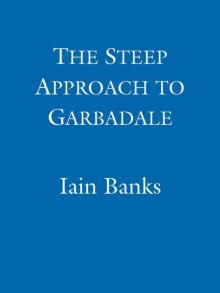 The Steep Approach to Garbadale
The Steep Approach to Garbadale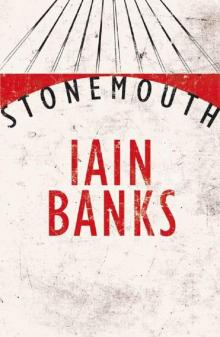 Stonemouth
Stonemouth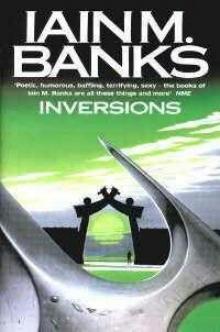 Inversions c-6
Inversions c-6 Raw Spirit: In Search of the Perfect Dram
Raw Spirit: In Search of the Perfect Dram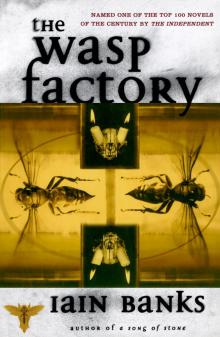 The Wasp Factory
The Wasp Factory Raw Spirit
Raw Spirit Walking on Glass
Walking on Glass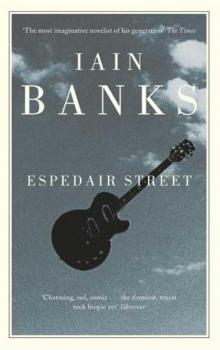 Espedair Street
Espedair Street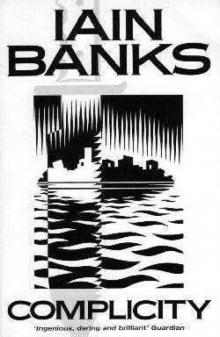 Complicity
Complicity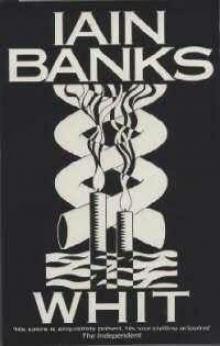 Whit
Whit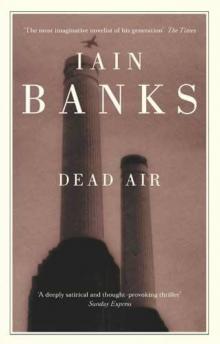 Dead Air
Dead Air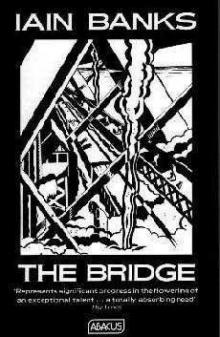 The Bridge
The Bridge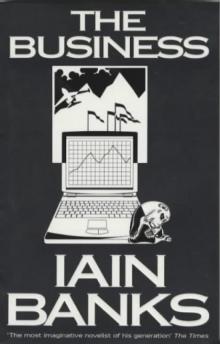 The Business
The Business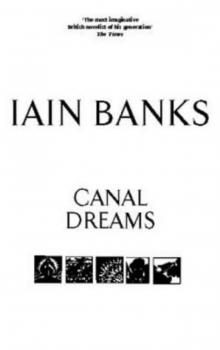 Canal Dreams
Canal Dreams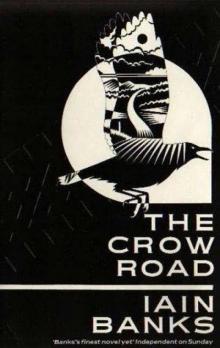 The Crow Road
The Crow Road